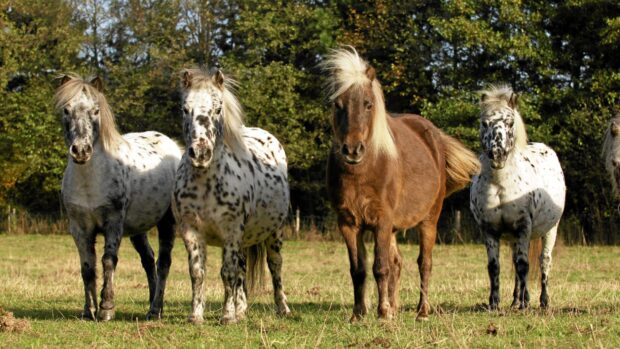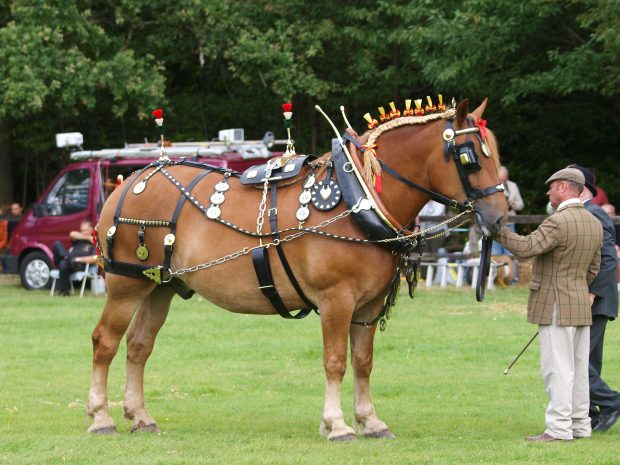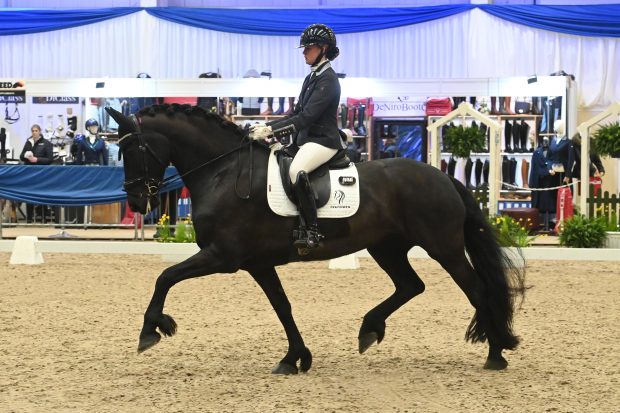The Friesian horse looks like it has come straight out of a fairytale. Known for its shining jet-black coat, flowing mane, tail and feathers, as well as its proud and powerful physique, the Friesian is an ancient horse breed that has proved its worth in myriad disciplines, from the battlefield to the circus, trotting races and nowadays dressage and driving. It is considered the only surviving native breed in the Netherlands (from the province Friesland) – where some sources believe 7% of the horse population are Friesians.
Looks and conformation
The Friesian is bred to be exclusively black. Around 100 years ago, there was a minority of bays and chestnuts, but now black is a prerequisite for registration into the studbook. Chestnuts are still found as a handful of stallions carried this recessive allele, but they are very rare, and are not accepted by the breed registries. The only white marking permitted is a star. They typically have a long flowing mane and tail, high-set arched neck, a thick crest and broad chest. The quarters are sloping with a low-set tail.
Friesians are a naturally powerful horse with a high-stepping trot action. The modern Friesian tends towards the lighter sport horse rather than the heavier draft type – there are two distinct conformation types, the larger-built “baroque” Friesian and the finer-boned Friesian sport horse. It is a compact warmblood, powerfully muscled and is ideally at least 15.2hh. They weigh on average around 600kg. Although they are quite a chunky sport horse, they are nimble and elegant.
The Friesian is said to be the foundation for the Old English Black, the ancestor to both the Shire horse and the Fell pony.
The Friesian temperament
All horses have their quirks and backgrounds, but the Friesian temperament is typically friendly, easy-going and willing to please. Their versatility is one of their hallmarks and as such can make a useful family horse: an all-rounder that excels in the dressage and driving arenas, but is equally happy to take friends out for a hack or a Sunday drive.
They are a popular breed for use in film-making – they often look the part in historical dramas and battle re-enactments, and are calm and trainable.
Unfortunately, Friesians are prone to a number of genetic disorders (dwarfish, hydrocephalus, aortic rupture and megaoesophagus), possibly due to inbreeding. This may contribute to their comparatively short typical lifespan of 16 years, although many do live until they are 30.
A potted history of the Friesian horse
The Friesian studbook (Koninklijke Vereniging Het Friesch Paarden-Stamboek (KFPS)) is the oldest in the Netherlands, founded 1879, and promotes the interest in this ancient breed worldwide, as well as establishing a breeding programme to maintain and refine the unique characteristics of the Friesian horse. The KFPS tagline is: “The Friesian horse. There she is: fiery, strong, intelligent, and looking just a bit superior. As if she knows of her centuries-old heritage. As if she knows of the place she has in so many hearts.”
Friesian horses can be found on every continent, in more than 70 countries, with more than 70,000 registered. There are many rules and regulations governing registration, stallion selection and young stock inspection. There are also guidelines for naming foals – in 2022, Friesian foals’ names should start with T, U or V.
Thanks to the KFPS, the breed is now well established in its modern form, but ancient texts testify that the Friesian has been an important breed for hundreds of years. As far back as 150AD, documents attest to Friesian horses being used in battle as war horses. Variations on the Friesian were used in the Crusades (probably crossed with Arabs and Andalusians). Some historians believe William the Conqueror rode a Friesian – it’s the archetypal war horse: strong enough to carry a warrior in armour, brave, bold and agile in battle.
The first written evidence of the name Friesian came in the 16th century in Germany, and by the 17th century, Friesians were well represented performing haut-école equitation.
The breed then became concentrated in the Netherlands in the 19th century, where it was used as a status-symbol carriage horse for wealthy land-owners and the KFPS studbook was established. However, the breed nearly became extinct – with just three breeding stallions in existence – as it was no match for the heavier draft breeds working the land. Mercifully a breeding programme ensued which, despite a few hiccups over the years, has enabled the breed not only to survive, but flourish.
As a result of a well-regulated studbook, pure-bred Friesian horses can be expensive. However, like any horse, the price will come down to the individual horse, its pedigree, age, temperament, training, background and ability. Relatively speaking, Friesians are typically more expensive in the US where they are still few and far between.
You may also like to read…
The real-life Black Beauty: meet the stallion dubbed the ‘most beautiful horse in the world’
Meet the stunning Friesian stallion who has gained the prestigious global title for his looks

The Irish Sport Horse — all the facts about this popular breed
Find out everything you need to know about this breed of horse

The athletic thoroughbred: everything you need to know
Find out everything you need to know about this popular breed of horse

Subscribe to Horse & Hound magazine today – and enjoy unlimited website access all year round
Horse & Hound magazine, out every Thursday, is packed with all the latest news and reports, as well as interviews, specials, nostalgia, vet and training advice. Find how you can enjoy the magazine delivered to your door every week, plus options to upgrade your subscription to access our online service that brings you breaking news and reports as well as other benefits.




